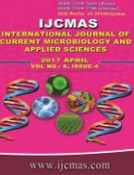


 National Academy of Agricultural Sciences (NAAS)
National Academy of Agricultural Sciences (NAAS)

|
PRINT ISSN : 2319-7692
Online ISSN : 2319-7706 Issues : 12 per year Publisher : Excellent Publishers Email : editorijcmas@gmail.com / submit@ijcmas.com Editor-in-chief: Dr.M.Prakash Index Copernicus ICV 2018: 95.39 NAAS RATING 2020: 5.38 |
Bacterial Vaginitis is the most common vaginal infection affecting women particularly during the reproductive years. This is a complex disorder that has been associated with an increased risk of other infectious conditions of the genital tract and premature delivery in pregnancy. There is a change in vaginal ecosystem when Lactobacilli dominated flora is absent or greatly reduced and replaced with mixed predominately anaerobic flora. Our aim was to study the bacterial flora of women with symptoms of vaginitis and compare with the bacterial flora of control group and also to evaluate the association between alterations in the vaginal flora and clinical symptoms. The study was performed among patients with vaginal infections attending OG Department of SRM Hospital, Kattankulathur. A total of 72 samples were collected, 40 samples were from symptomatic population and 32 samples were collected from age matched women without any symptoms. However no single bacteria were shown to be the primary cause of vaginitis. This study concluded that there was no significant difference in study and control population. In the future, by using molecular techniques, we may better diagnose each subtype of BV, and able to tailor treatment appropriately.
 |
 |
 |
 |
 |